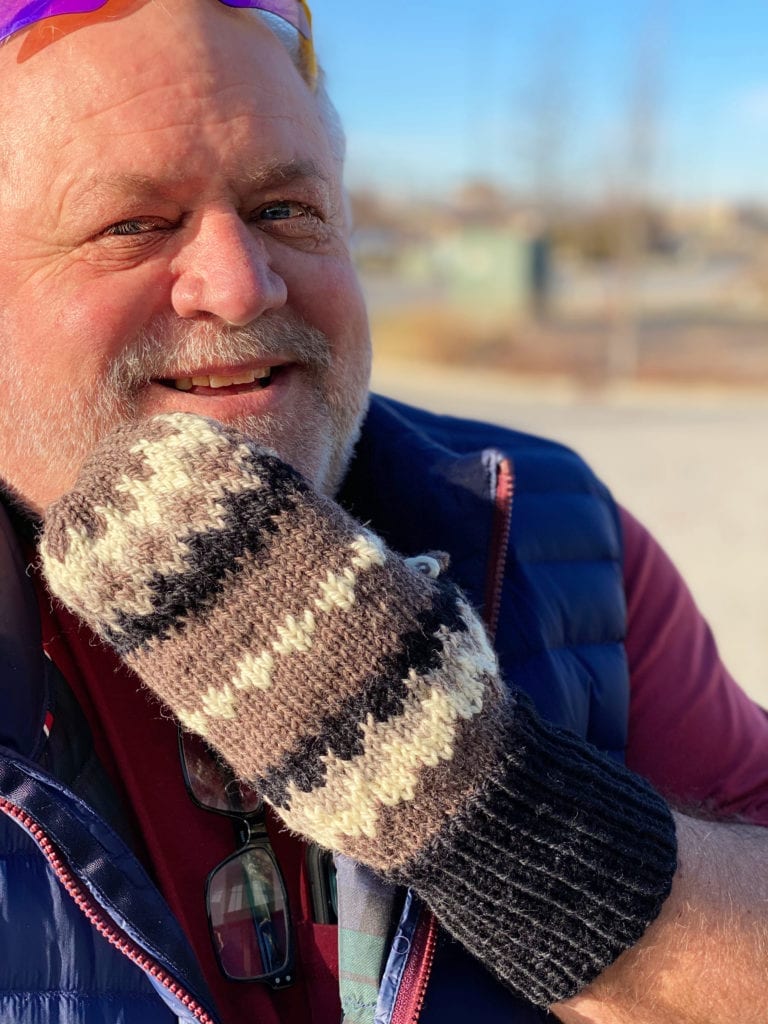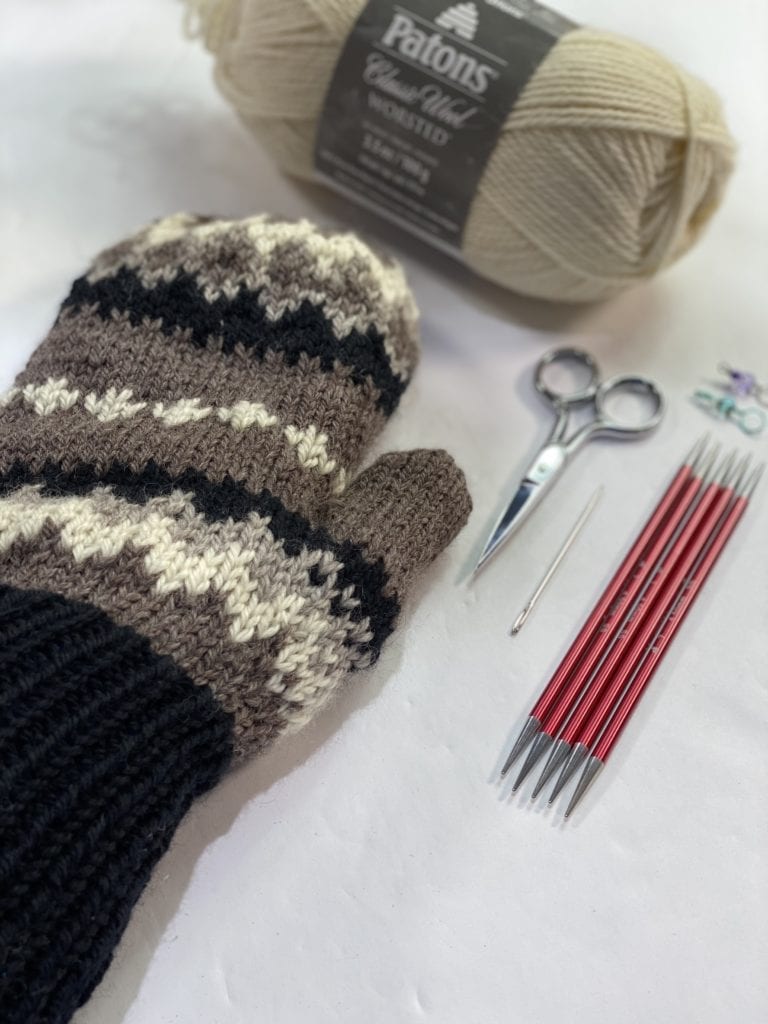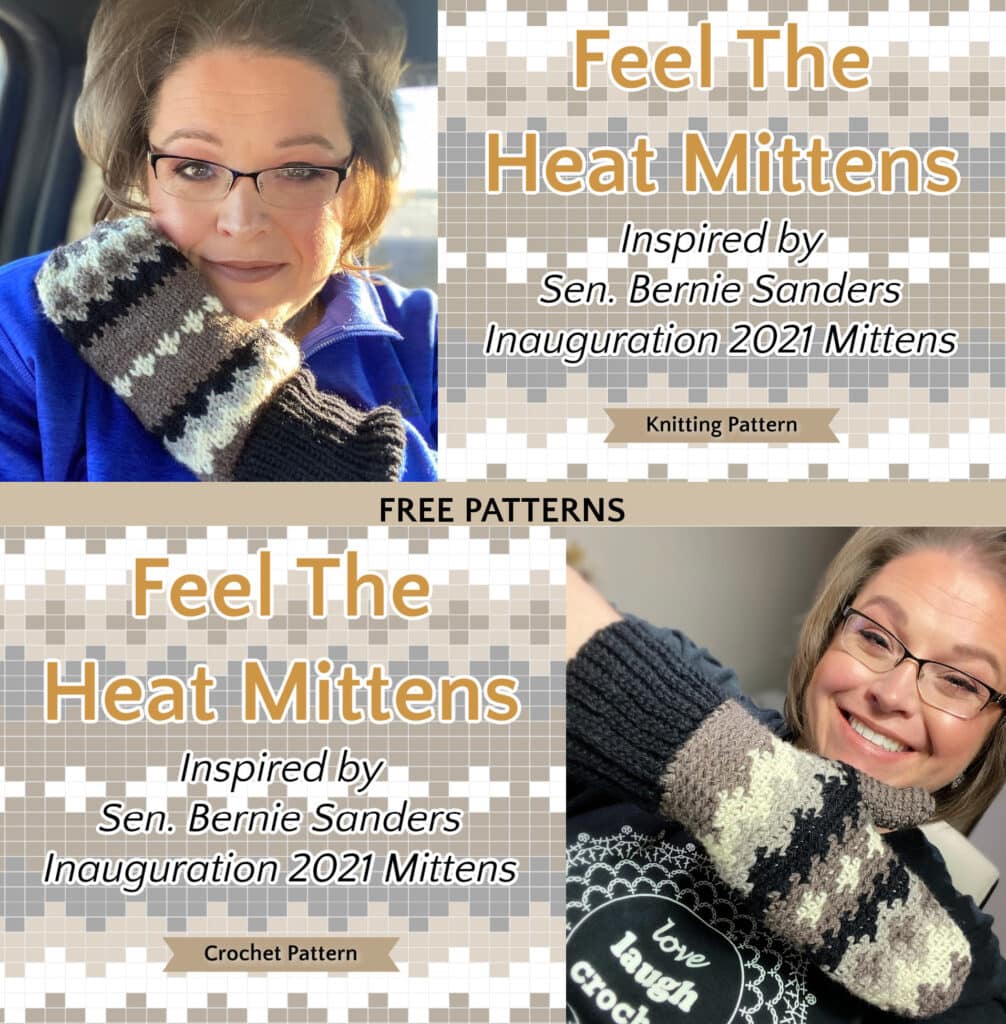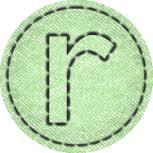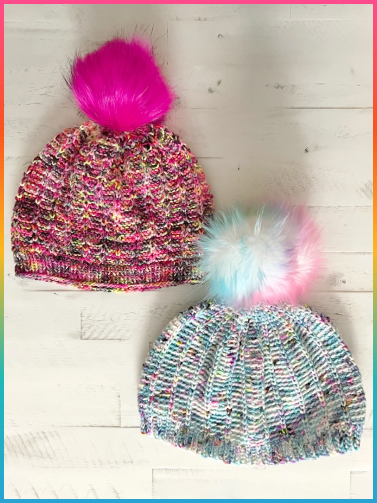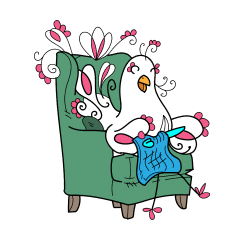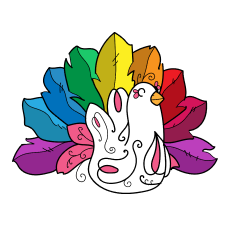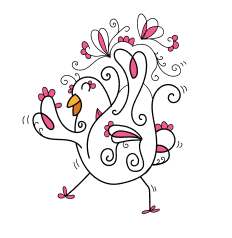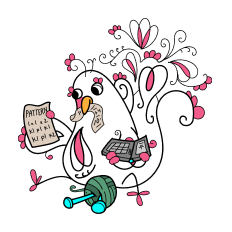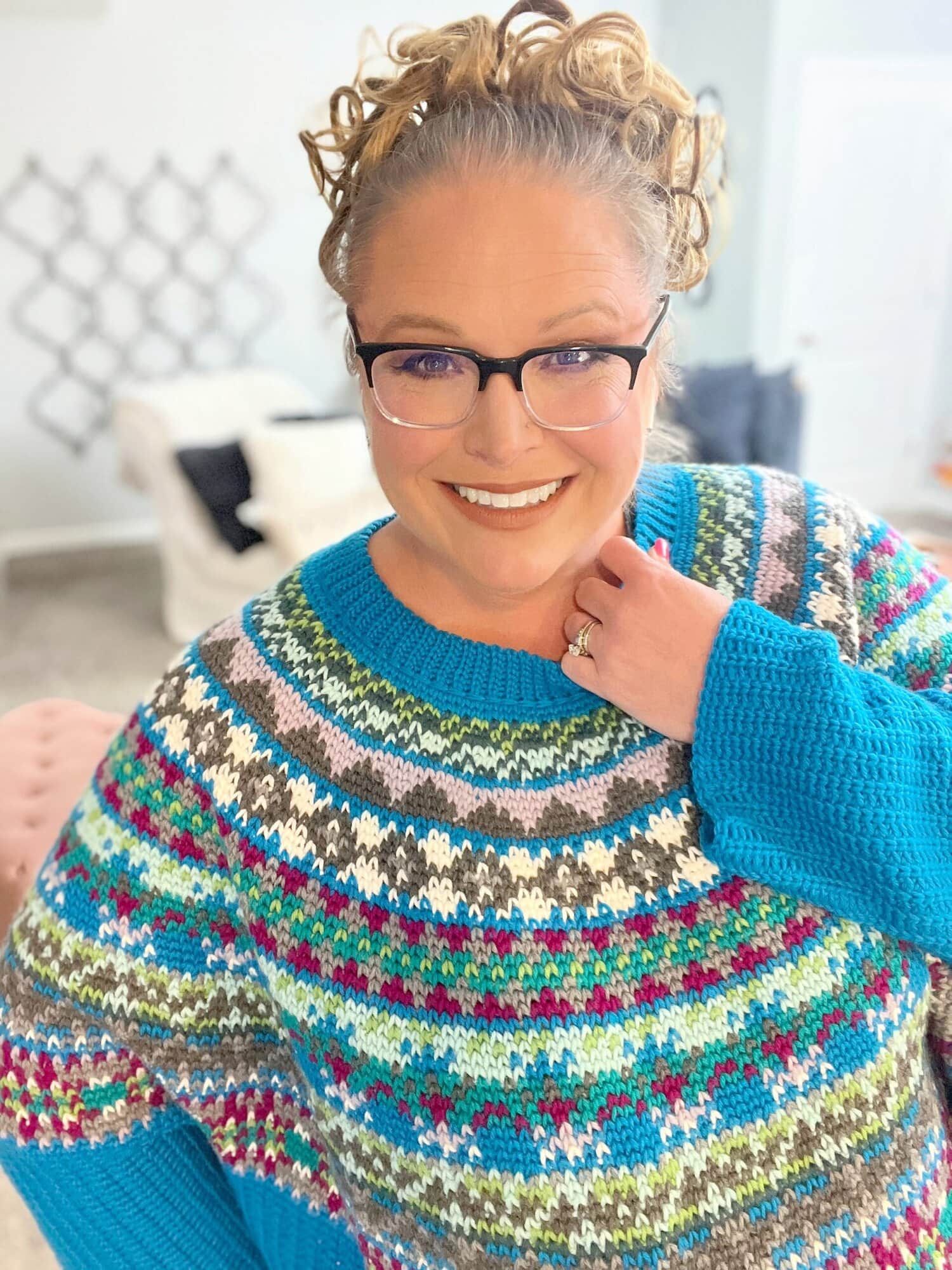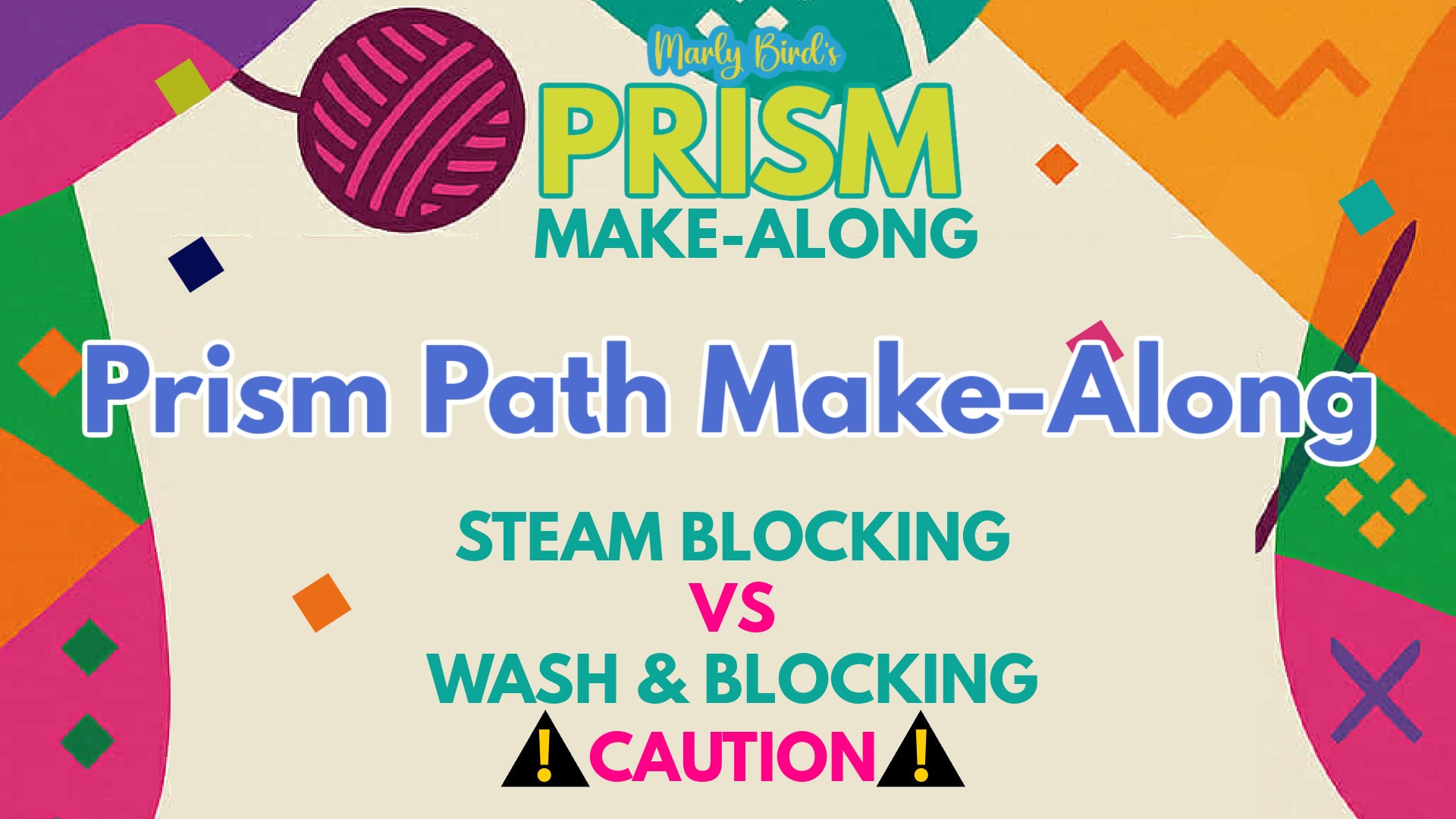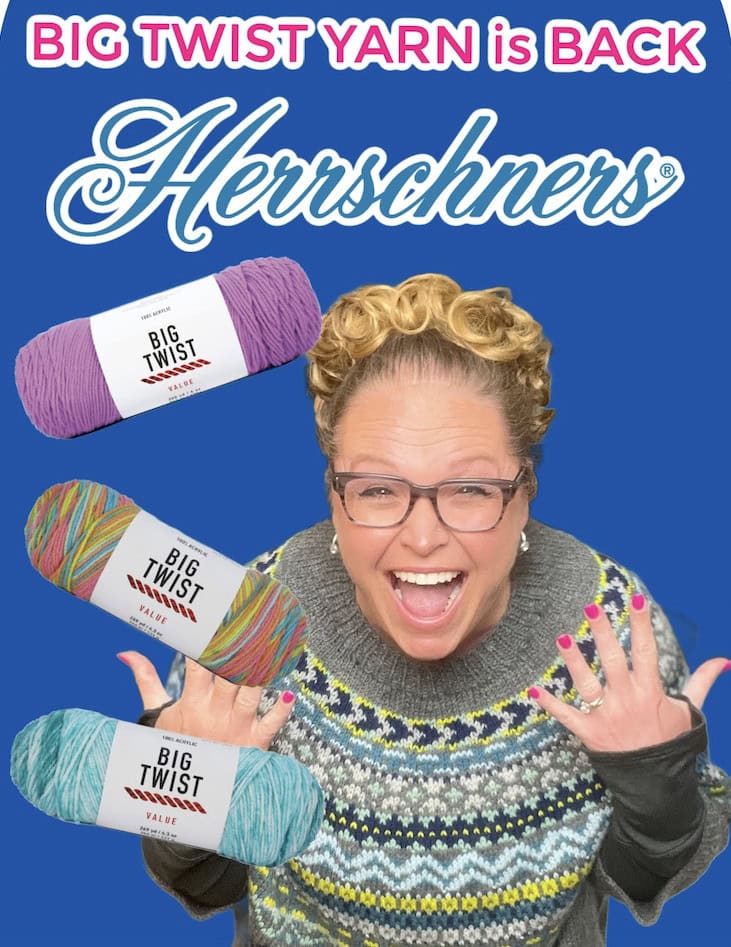Bernie Sanders Inspired Mittens – Feel The Heat Knit Mittens
All my knit and crochet friends are looking for a great pattern for the Bernie Sanders Inspired Mittens. Look no further than here! Get a free knitting pattern for the Feel The Heat Knit Mittens by Marly Bird (inspired by the Bernie Sanders Mittens no in affiliation with him or the original mittens).
That’s right, you saw the inauguration and you’ve seen all the meme’s and now you want to make your own Sen. Bernie Sanders inspired mittens. Like I said, you are not alone. Many of you reached out to me to ask if I could write a pattern similar to his now famous mittens. Well, the long and short of it is, yes I can, and yes I did!
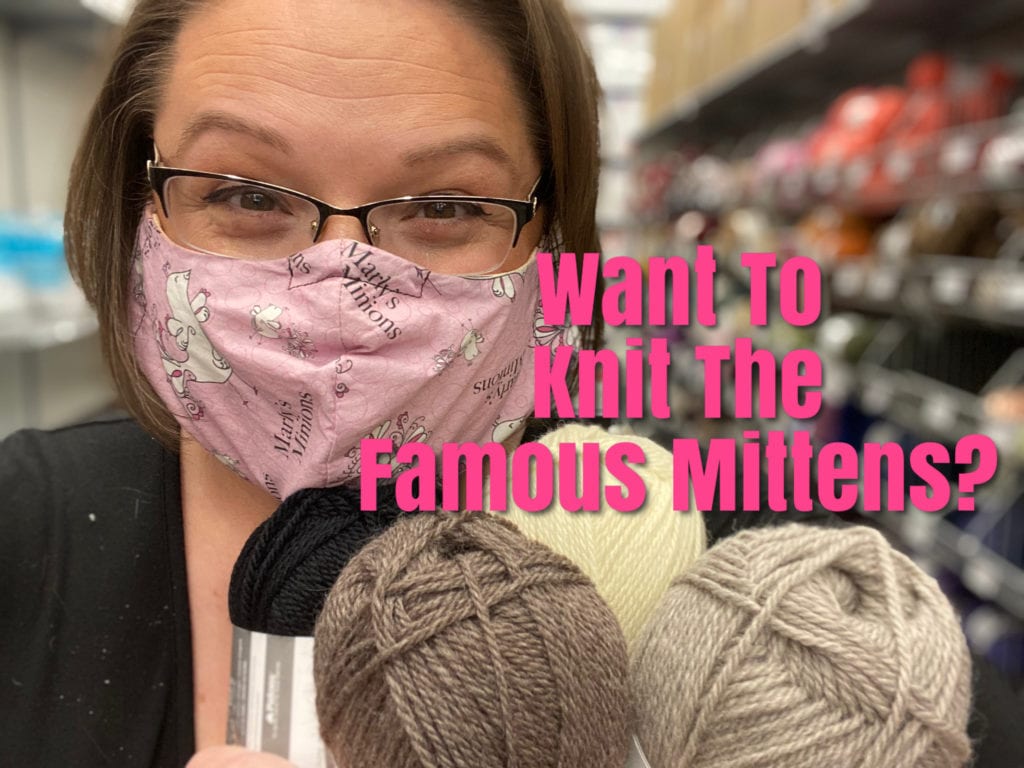
*This post contains affiliate links. By clicking on one of these links and making a purchase a portion will go to the blog. The price you pay will not change and the small commission I receive helps me to keep bringing you free content and giveaways on the blog. Thank you for your continued support.*
Let me introduce to you the Feel The Heat Knit Mittens. This is a hand knitting pattern inspired by the beautiful “smittens” worn by Sen. Bernie Sanders at the 2021 Presidential Inauguration.
➡️ Favorite them on Ravelry and Queue them up! https://www.ravelry.com/patterns/library/feel-the-heat-knit-mittens ⬅️
*Disclaimer: Let me state clearly that neither this pattern or myself are affiliated or endorsed by Sen. Sanders. This pattern is an artist’s’ interpretation of the original pattern and not a 100% copy as that would not be right.
What is a “smitten”? It is a mitten made out of old sweaters! See, the mittens worn by Bernie are actually made out of recycled sweaters making them “smittens. Now, in order to 100% duplicate the mittens I would need to make knitted fabric, cut it up and then sew it all together. Which is a nice option if you want to do that, but alas, I did not.
Instead, I used the skills I have as a knitter (LOOKING for the CROCHET PATTERN? >> CLICK HERE << ) to design a fabric that can be made in the round and turned into a nice pair of fair isle mittens that are inspired by and resemble Bernie’s.
Side note: If you want to read all about the original smittens and the wonderful woman who made them for the senator, check out this story: https://www.npr.org/2021/01/21/959335867/meet-jen-ellis-the-woman-behind-sanders-meme-worthy-mittens or here: https://slate.com/human-interest/2021/01/bernie-sanders-inauguration-mittens-vermont-teacher-interview.html
Anyway, here is the Feel The Heat Mitten pattern for knitters. There is a video tutorial to go along with the pattern here https://youtu.be/iZBlXvUn_84
Print this pattern and download the charts. Then go stash diving and grab some worsted weight yarn (that was the most requested yarn weight for this pattern by the Marly’s Minions FB Group) and some needles.
If you make this pattern PLEASE be sure to share with me on social media! #MarlyBird #MMMDI #MarlyBirdYouTubeChannel

Feel the Heat Knit Mittens
Designed by Marly Bird
SKILL LEVEL
Intermediate
MEASUREMENTS
To Fit Size
Adult Medium Women (Adult Large Women, Adult Large Men)
Hand Circumference: 7-8 (8-9, 9-10) inches [18-20.5 (20.5-23, 23-25.4) cm]
Finished Measurements
Finished Hand Circumference approx: 7 (8, 9) inches [18 (20.5, 23) cm]
Hand Length (not including cuff) approx: 6 (7, 8) inches [15 (18, 20.5) cm]
Gauge
20 sts and 26 rows = 4″ (10 cm) in Stockinette stitch in the round with larger needle
MATERIALS
Patons Classic Wool Worsted (100% pure new wool, 194 yds / 177 m, 3.5 oz/100 g)
1 ball Color A: Black
1 ball Color B: Heath Heather
1 ball Color C: Aran
1 ball Color D: Natural Mix
Needle
US 6 (4 mm) set of 5 double pointed needles — or size required for gauge
US 7 (4.5 mm) set of 5 double pointed needles — or size required for gauge
Notions
Scrap yarn for holding stitches, stitch markers, tapestry needle
ABBREVIATIONS
BO – Bind Off
CO – Cast On
DPN – Double Pointed Needle
K – Knit
LHN – Left Hand Needle
M1 – Make 1 (1 increase)
P – Purl
RHN – Right Hand Needle
Sl – Slip
St st – Stockinette Stitch (see pattern stitches)
st(s) – stitches
SPECIAL STITCHES
k2tog: Knit 2 sts together (1 st decreased).
M1: (make 1) Insert LHN under horizontal strand between st just worked and next st, from the front to the back, knit through the back loop (1 st increased).
Kitchener Stitch:
Divide sts evenly onto 2 dpns, and hold them parallel to each on the with WS facing. With yarn working yarn on back needle, cut yarn, leaving a long tail, and thread tail into tapestry needle.
Prep: Bring threaded tapestry needle through first st on front needle as if to purl, leave on the needle. Bring threaded tapestry needle through the first st on the back needle as if to knit and leave on the neede.
Step 1: Bring threaded tapestry needle through first st on front needle as if to knit and slip this st off needle.
Step 2: Bring threaded tapestry needle through next st on front needle as if to purl and leave st on needle.
Step 3: Bring threaded tapestry needle through first st on back needle as if to purl and slip this st off needle.
Step 4: Bring threaded tapestry needle through next st on back needle as if to knit and leave st on needle.
Rep Steps 1–4 until all sts have been grafted.
Front needle: Knit off, purl on.
Back needle: Purl off, knit on.
PATTERN STITCHES
1×1 Ribbing pattern
(Worked circularly, multiple of 2 sts)
Every round: *K1, p1; repeat from * around.
Stockinette pattern
(Worked circularly)
Every round: *Knit; repeat from * around.
Fair Isle pattern
(Worked circularly, multiple of 4 sts)
Working in Stockinette pattern, follow the chart attached for the size you’re making. Start at the bottom right corner and read the chart from right to left. Each row represents 1 round of knitting.
Updated Charts 11:35 pm EST 1-23-2021: There was some confusion with the chart for the thumb on the previous version as to where to begin reading it. Therefore, I eliminated the first 4 rounds and have the chart now show a starting point on round 5.
Also, the cast on number for the Adult Large Men size was typed incorrectly on the pattern but correct on the chart. It is now correct in both places.
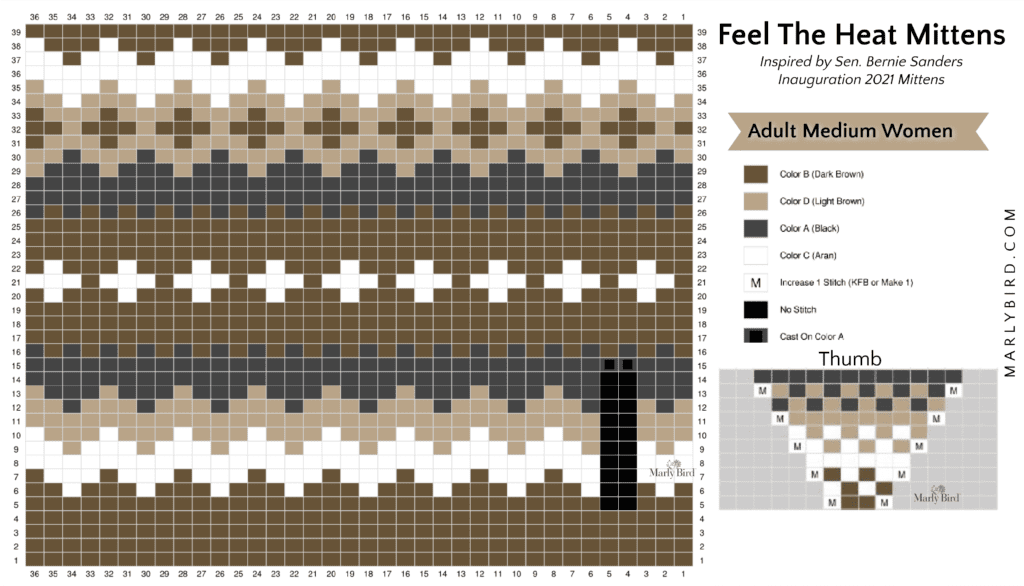
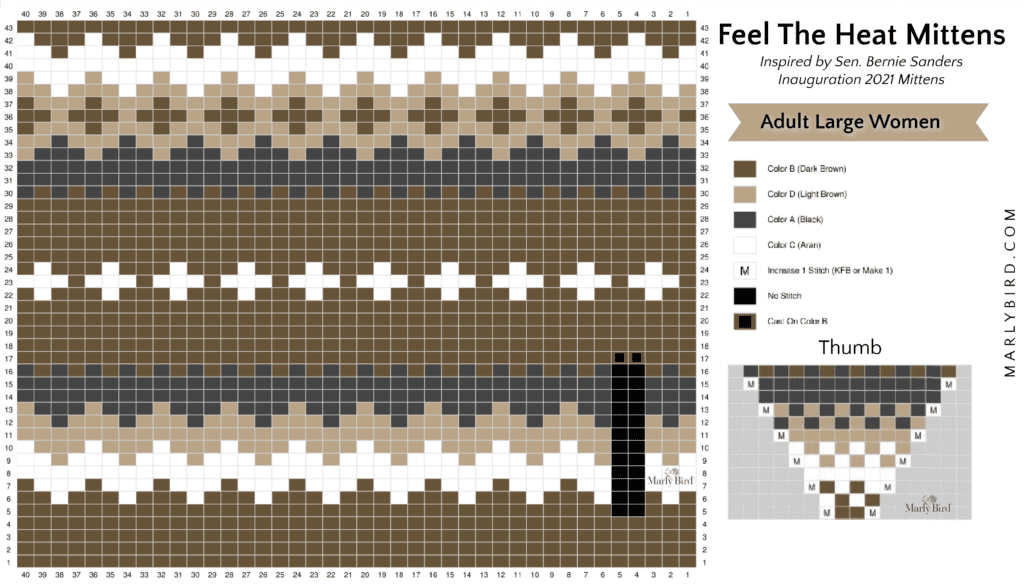
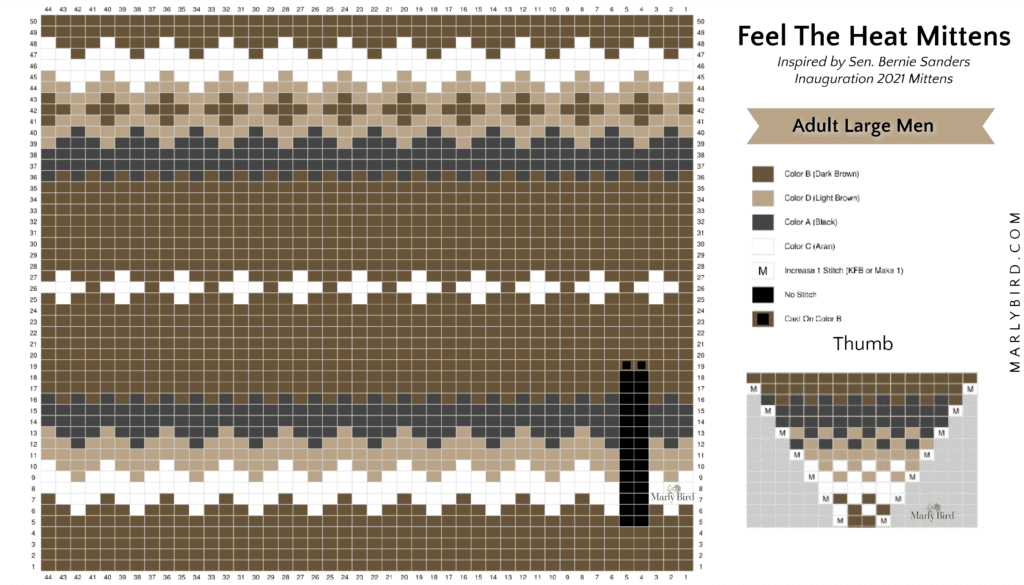
NOTES
- Sizes are written for the smallest size. If changes are necessary for larger sizes the instructions will be written thus ( ).
- Mittens are worked in the round from cuff to fingers.
VIDEO TUTORIALS
- No cuss cast on with double pointed needles https://youtu.be/0d6i5bRL52A
- Perfect Ribbing https://youtu.be/ByLQC3s36mc
- How to weave floats https://youtu.be/TNVVI0iGqvs
- How to add a lifeline to knitting https://youtu.be/FiqYUE_aHAw
- How to Kitchener Stitch without ears https://youtu.be/lGxJ7wccHGA
- How to bury in ends https://youtu.be/8_NBGUKjO-E
- How to make the Bernie’s Mittens Tutorial | Feel The Heat Mittens https://youtu.be/iZBlXvUn_84
FEEL THE HEAT KNIT MITTENS PATTERN
CUFF
With smaller dpn’s and color A,
CO 36 (40, 44) sts, and divide sts evenly onto 4 dpns. Join rnd and mark first st.
Work in 1×1 Ribbing pattern (see pattern stitches) until cuff measures 4” [10 cm]
HAND
With larger dpn’s
Rounds 1-4: Work in Stockinette stitch and follow the chart for the size you are making through round 4.
THUMB GUSSET
On the charts for all sizes, stitches #4 and #5 are shown as no stitch beginning on round 5 and remain no stitch through rounds 14 (16, 18).
Stitches #4 and #5 are actually the first two stitches on the thumb chart. When working the thumb gusset, work the thumb chart over those two stitches and the added M1 in the gusset section through round 14 (16, 18). There is a marker in place to help you easily identify the gusset stitches.
When making the M1, use either color that is used in that round to complete the stitch.
Round 5: K3, pm, M1, k2, M1, pm, knit to end of round — 2 stitches increased for thumb gusset; 4 stitches between markers.
Rounds 6-14 (16, 18): Follow main chart to gusset marker, slip marker, follow thumb chart to 2nd gusset marker, slip marker, continue to follow main chart to end of round.
At the end of round 14 (16, 18) there are 12 (14, 16) gusset sts between markers.
Next round: Work in pattern to gusset marker, place 12 (14, 16) gusset sts on a scrap yarn holder, remove markers, backwards loop cast on or cable cast on 2 sts, work in established pattern to end of round — 36 (40, 44) sts
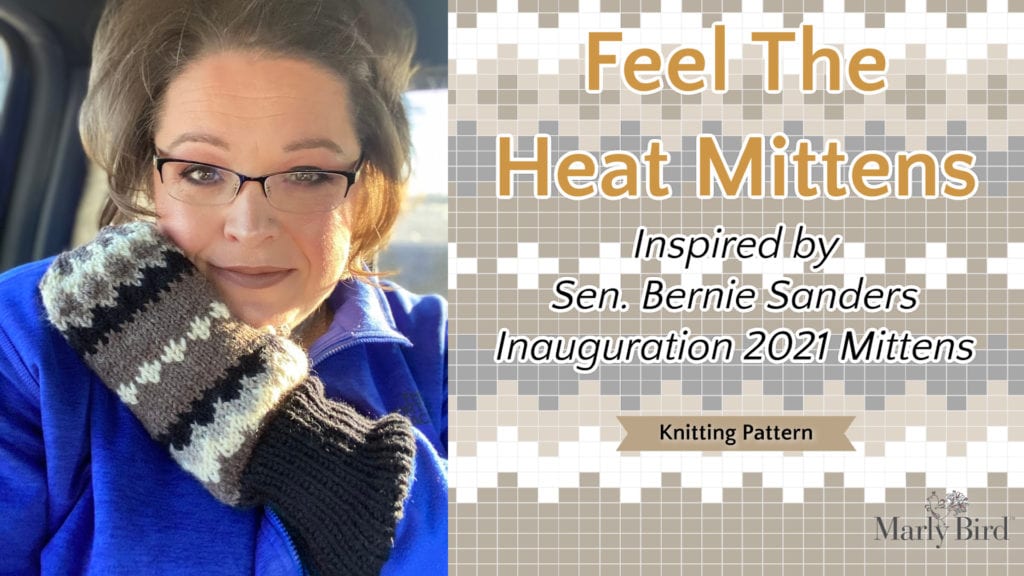
HAND CONTINUED…
Continue to follow the main chart to the last round.
Note: The distance of the hand from thumb holder to top of mitten is customizable. If you need to make a change to the length of the mitten, I recommend adding/removing rounds in multiples of 2 with color B in the center section of the chart.
For example: Add/remove 1 round after round 17 and Add/remove 1 rounds before round 25 (29, 35) on the chart.
TOP OF MITTEN
With color B
Next Round: *K2tog; repeat from * to end of round — 18 (20, 22) stitches
Last Round: Knit
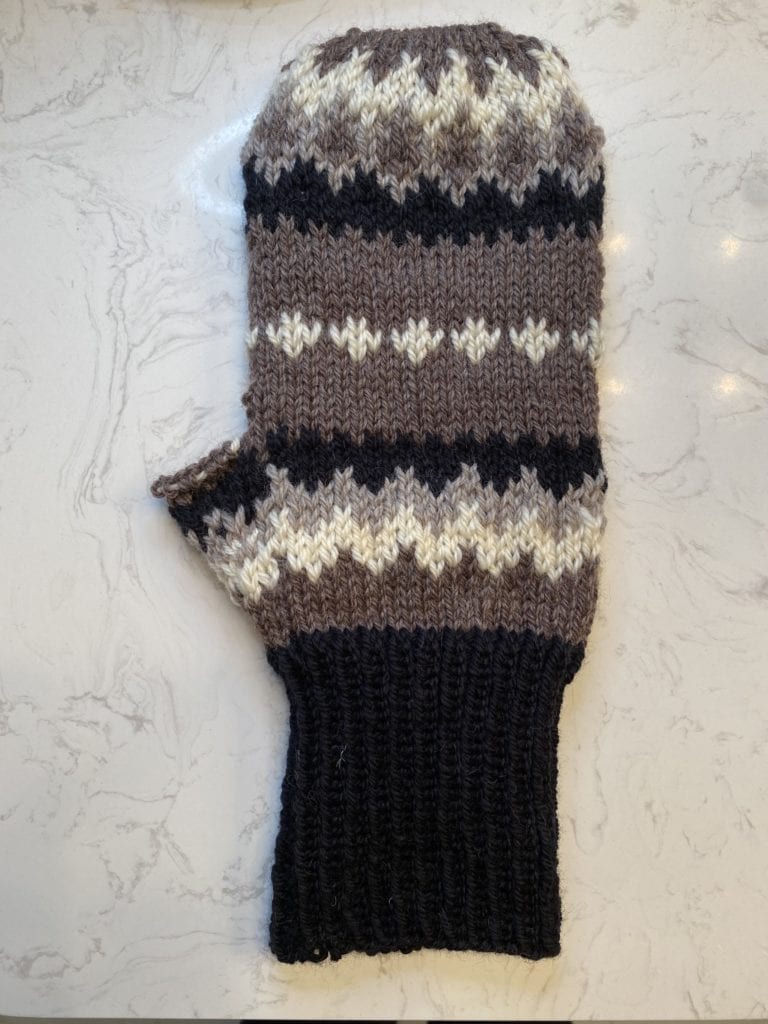
FINISHING
Work the Kitchener Stitch on the final stitches with color B.
Weave in all loose ends.
THUMB
Place gusset stitches from holder onto larger dpn’s.
Round 1: With color B, pick up and knit 2 stitches at cast on, then with RS facing, work in Stockinette stitch around the thumb — 14 (16, 18) stitches.
Continue in Stockinette stitch until measures 1.5 (2, 2.5)” [3.8 (5, 6.3) cm] or to desired length.
Next Round: *K2tog; repeat from * to end of round — 7 (8, 9) stitches.
Cut yarn leaving a long tail and thread onto tapestry needle. Working around the work, insert the tapestry needle as if to knit and remove the stitch from the needle. Pull the tail through all the stitches and pull snug like a drawstring.
Weave in tail to the WS of the mitten.
